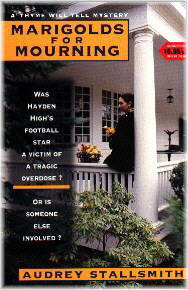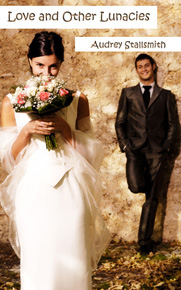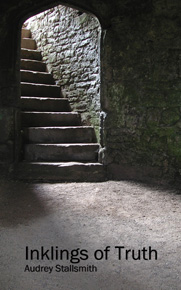with Audrey Stallsmith
 Led "down the garden path" usually means "deceived." However, we mystery lovers actually enjoy being kept in the dark for a while, because we know all will be explained eventually.
Led "down the garden path" usually means "deceived." However, we mystery lovers actually enjoy being kept in the dark for a while, because we know all will be explained eventually.
So I'm fond of garden paths myself, especially twisty ones where you can't see what's around the next bend. The beauty of both life and horticulture is that we never know what will be coming up next. Perhaps it's time we embraced that uncertainty rather than resenting it.
Throw It Down!
Our first writers conference after Covid didn’t go off without a hitch. In fact, it was hitchy and glitchy, as we had to adapt to all the changes at a new venue and to a board member and faculty member both testing positive at the last moment and having to stay away. Then our treasurer, who usually runs to bookstore, had to go home too after her babysitter came down with a different ailment.
So, a dazed me found myself selling books instead of attending classes. That was a peculiar choice on the part of the other board members, since I probably was the only one present who had never used a smart phone such as the one which contains our selling app.
(I’m guessing I got stuck with the job because the duties of my registrar’s position concluded at the beginning of conference, while everybody else had other things they needed to be doing. I don’t know for sure since I was commuting this year and not actually present to object when the decision was made—perhaps another reason I was chosen!)
Fortunately, since the bookstore was open only during the afternoon, I still was able to attend morning sessions. And one of our faculty members, Eva Marie Everson, talked about Moses being asked by God to throw down what was in his hand.
Granted, there were several times during the week when I felt like throwing down that smartphone—pretty forcefully too, I might add! But that wasn’t her point. She meant that you give God whatever is in your hand at the moment. And the important part of the transaction isn’t who you are or what the object in your hand is—but who God is.
You’ll notice that when Moses said, “I’m not the person for a job like that,” God didn’t dispute the point, but found it irrelevant. Anybody else probably would have tried to build Moses up with positive thinking. God, who knows our weaknesses all too well, just reassured him that “I will certainly be with you.”
Moses probably had been believing for years that the only reason he survived Egypt was because he was a cute kid, the ancient equivalent of the Gerber baby. So, he wasn’t exactly keen on going back there. Then there was that stuttering thing—or was his speech impediment a lisp?
Moses being in the Pharaoh’s court would be the equivalent of a Jew being in Hitler’s inner councils, so I’m guessing that his adoptive mother probably lied to her father about what nationality the child was. With all the pressure of possibly being found out at any moment, it’s no wonder that the poor kid had a problem talking straight. Still, that trait wouldn’t be as adorable in an aging shepherd as it might have been in a princess’s son. He would just look ridiculous.
Too often we believe that faith is having to take a leap in the dark. But, as Dallas Willard points out “Faith is commitment to action, often beyond our natural abilities, based upon knowledge of God and God’s ways.” After all, Moses had just seen a flaming bush which didn’t burn up and a rod which writhed. That should have proved to Him that God was quite capable of using whatever or whomever was at hand, adequate or not.
So, did I miraculously become a whiz at smart phones? Not so much. But I at least provided conferees with an opportunity to test their Christian patience!
Things didn’t exactly go smoothly for Moses either. If he’d known how many plagues it was going to take to shake loose Pharaoh’s grasp on his slaves, the great deliverer probably would have delivered a more decisive “No” than the waffling, “Can’t you find somebody who’s better at that sort of thing?”
But sometimes we have to be humble enough to take on things at which we aren’t very good if they aren’t going to get done otherwise. And trust God to cover the gaps.
The Bronte "Curse"
I’ve just been reading a biography of Charlotte Bronte and discovered that not as much has changed in the publishing business as you might think. Although all of the Brontes had writing talent, they initially couldn’t make a living at it. The children of a poor vicar, they had to take other jobs at which they weren’t very good, as teachers, tutors, or governesses.
During her teaching experiences, Charlotte was apt to grow impatient with the denseness of students who didn’t share her intelligence. Her equally bright siblings may have had the same problem with their young charges.
After getting a few poems published in newspapers, Branwell fell into alcoholism and drug abuse following a disastrous affair with an employer’s wife, which ended his career as a tutor—and apparently his writing career as well. It also seems to have ended his sister Anne’s five-year stint as a governess with the same employer, she being the one who had stuck at a single job the longest.
In pure desperation, Charlotte, Emily, and Anne finally paid to have a book of their poetry published, which sold a not-so-grand total of two copies in its first year. Emily and Anne also had to subsidize the publishing of their novels, Wuthering Heights and Agnes Grey, proving that self-publishing is nothing new. Neither book was very well received at the time.
However, Charlotte convinced a publisher to pay her for Jane Eyre, which shortly became highly popular. Anne wrote another novel, titled The Tenant of Wildfell Hall, which also sold well due to its realistic and somewhat scandalous subject matter of an abused wife leaving her husband. Unfortunately, the novel also brought criticism down upon its author’s head. Apparently wives of that time period were expected to endure abuse without rebelling against it.
Emily and Anne both died of consumption shortly after the publication of their books, so they didn’t live long enough to get past the initial criticism of their work to the part where they were considered literary geniuses! Charlotte endured to see a couple more of her books—Shirley and Villette—published, though the public didn’t seem to like them as well as her first. After marrying one of her father’s curates, she died within a year of that marriage from what doctors now believe may have been the same extreme form of morning sickness with which Kate Middleton was afflicted.
Would the Brontes, therefore, have been better authors had they been born into wealth and never had to struggle? It’s tempting to believe that they might at least have lived longer!
But we have to recognize that the sisters’ novels derived their power and passion from the authors’ reduced circumstances.
Their bitterness about the few options open to women in Victorian society erupts in their prose. Had the sisters been wealthy, perhaps they would have had much more time to write, but much less to write about. Under those circum- stances, it seems doubtful their work would have made the impact that the Brontes did.
We can see a distinct difference between the women’s reaction and Branwell’s. He simply gave up and slid into debauchery while his sisters continued to fight. Charlotte and Anne, at least, seem to have hung on to their faith in God despite their circumstances. It must have taken jaw-clenching effort for them to do so, especially for Charlotte after the rest of her siblings died in rapid succession.
After reading about what the Brontes suffered, we modern aspiring female authors can feel better about our own situations. Although it may be as difficult as ever to make money from writing, most of us will have longer to work at it and many more options as far as “day jobs” go. So, if we fail to overcome our circumstances as well as the Brontes did, we have only ourselves to blame!
Chesterton and Sainthood
On the first Friday of this month I took a day off from my usual pursuits to nip down to the annual G. K. Chesterton conference. Usually held at too distant a location for me to attend, the conference somehow ended up at Slippery Rock University this year, less than an hour's drive away.
That probably makes it sound too easy. Somehow, on the way down our road that morning, I contrived to get a tree branch wedged under the chassis of my car--and had to return home briefly for help with its removal. Leaving the conference that evening proved no less hazardous, since I recklessly attempted to exit a different way than that by which I had come, and ended up driving around the campus in the dark for longer than I care to remember.
Chesterton would have considered such mishaps adventures, since he probably experienced lots of them himself. In fact, if all the stories told about him can be believed, the jolly, obese, rumpled, and bespectacled journalist had a professor's absent-mindedness without actually being a professor!
He also had an enormous sense of humor, and probably would find a conference held in his honor--and the current drive to make him a Catholic saint--uproariously funny. One of the few Protestants present at this year's event, I found the idea of Chesterton as a saint amusing myself, since I knew that persons canonized must have performed miracles. Considering the enormous impact he has had on other Christian writers, though, perhaps the idea isn't so far off base.
I've always thought I would love to have C. S. Lewis's reward in heaven, since that former atheist has influenced so many conversions--including my own. But his own change of heart was partly sparked by his reading the Christian writers who came before him, with two of the most important he mentioned being George MacDonald and Chesterton. And the conversion of a sceptical intellectual like Lewis must be at least a small miracle.
To discover why Lewis found Chesterton irresistible, you need only read Orthodoxy, which sounds like a stuffy title and is anything but. Or, if you prefer, you can begin with the Father Brown short stories which remain my favorite mysteries. (No, they are nothing like the dull imitations currently playing on PBS.)
"Angels can fly," Chesterton once wrote, "because they take themselves lightly." Perhaps the same can be said of saints and writers!
Small Wonder
At the end of June, I attended the 59-year-old St. Davids Christian Writers Conference, for which I am registrar. Originating near St. Davids in eastern PA, the interdenom- inational event now is held on the campus of Grove City College in western PA.
How a small conference has managed to survive for so many years remains an enduring mystery. But St. Davids has something that other conferences don't. Everyone agrees on that, though everyone also has a hard time pinning down exactly what that something is.
Since we get conferees from a wide variety of denominations, we should wrangle over our differences. Not to mention that we creative types can be "odd," to put it mildly. Still, we feel like family, which scripture tells us we are.
Introverts such as myself find the event less stressful than a larger gathering would be. Too, there isn't as much frenzied competition for the attention of editors and agents, since they usually have time to chat with everyone.
I met my first agent there, so I might never have gotten published without St. Davids. However, the conference means much more than that. Writing, after all, is a difficult and often lonely business where rejection is the norm. Perhaps the warmth we feel when we come together is God's blessing on our acceptance and understanding of each other. That's the closest I can come to explaining it anyway.
Meanwhile, as we close in on the conference's 60th birthday, we board members are learning to stop panicking at every setback--and to stop apologizing for our smallness. As Gideon learned, sometimes you need to limit the size of your army, just so you won't be tempted to take credit for what God has done.
Back To High School
We local authors recently went back to public school again to help teenage writers critique their own work. The event is called Writers' Day and was established by our mentor, creative writing teacher Evelyn Minshull. Her age and ill health no longer allow her to participate, but we keep up the event in her honor.
Being back in those claustrophobically narrow halls again reminded me of my youth, even though I transferred to a private school after seventh grade. I was one of those painfully shy kids who are picked on--probably more for their apparent aloofness than for anything else.
This time, though, we former wilting wallflowers were important people. We were waved to the front of the cafeteria line for our sticky General Tso's chicken, tinny-tasting fruit cocktail, and milk in cardboard cartons.
When we needed to feel that important back in our own school days, Evelyn brightened our young lives by convincing us writing was one thing we could do well. If you don't talk much, after all, you usually have plenty of words pent up, waiting to spill out onto paper.
In those days, we did our spilling in longhand or on clackety typewriters. Computers make the process somewhat easier for the kids now, but not much else has changed.
If you believe the digital age is producing a generation of dunces, I can assure you that isn't true. Although a few of the kids probably just came to get out of their classes, most who participated obviously were highly intelligent and highly talented. They also seemed supportive of each other, as they probably have to be in a milieu often dominated by bullies and cheerleaders.
For this day at least, the creative students received all the cheers. Could they only know it, they are the important ones, the ones who will still have much to contribute to the world long after the high school jocks and beauty queens have run to fat.
As for we adults, we should outgrow the need to feel important, but I doubt we really do. If we are lucky, though, we learn attention from God is what matters, and all of us have that.






